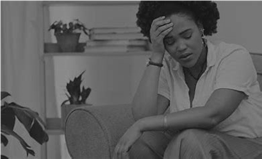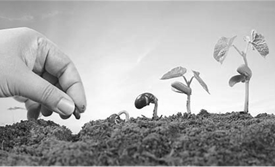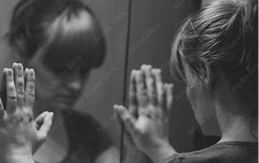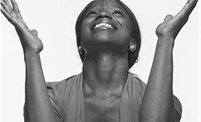Make a contribution today to help support our transitional home program provide the critical services, resources and nurturing support that our women and children need to thrive mentally, emotionally, and become self-sufficient. 100% of the contributions donated ensures that survivors continue to have a safe place to heal, grow and rebuild, and regain their self-worth.
Together with your support and generosity, we can continue supporting and cultivating a future where trauma survivors receive the valuable tools & resources to build new lives and the courage and tenacity to live productively. Let’s support together!
Please click on the image below and make a contribution.
Marie’s Story: How Courageous Women Association gave me the strength to say, “I deserve better”
By Marie B.
I’m a twin. I was born two minutes after my sister. Growing up, I was always in her shadow. We had an older brother, but he passed when we were 12. After that, it was just us and our mom.
My mama was a very strong woman. I saw her cry only twice. I believed that crying was a weakness—that when you’re hurt, you just keep going. It wasn’t until I joined the Courageous Women’s Association (CWA) many years later that I learned how important it is to process my feelings and take the time to care for me.
But back then, I was just surviving. When I was 21, I met a man whom I thought accepted me for who I was. He wanted me even though I wasn’t the slimmest girl or the most glamorous. I didn’t realize he was manipulating me. He was a wolf in sheep’s clothing; he knew exactly what he was doing.
The abuse was so frequent that I don’t remember the first time it happened. I used to lie about it, even to myself. But eventually, something clicked. I thought, “I do too much to be treated like this,” and I decided I would leave him.
Then I found out I was pregnant. I was staying with my mom, and he moved in with us. I tried to make it work, but the situation was toxic. I was holding down two jobs and giving him money, and he was going back and forth between California and Alabama, where he has other kids.
My son’s birth was extremely traumatic. He came more than a month early, and I had to have an emergency C-section because his heart rate was dropping. He spent six weeks in the neonatal intensive care unit with all kinds of tubes hooked up to him.
When I finally brought my baby home, I didn’t know what to do. All I knew was to keep going, like my mama taught me.
Trauma After Trauma

I don’t know what I would have done without my mom. She watched my son when I went back to work, and they became like best friends. It used to irritate me because I didn’t get that affection from her when I was a kid. But I realized her helping with my son was her way of telling me she loved me. It was her way of saying, “I got you. I know I wasn’t there for you emotionally before, but this is how I’m making up for it.”
My parents both died the year my son turned four. It was trauma on top of trauma on top of trauma. I was diagnosed with severe depression, anxiety, post-traumatic stress disorder, and insomnia. I was working the graveyard shift, but I got fired because I kept falling asleep on the job. All this time, my son’s dad was off doing whatever he was doing. And now my mama was gone, too.
It was a messed-up time. My son was missing a lot of school because I couldn’t physically get up. I couldn’t leave the house. I couldn’t work. I was eating anti-depressants like vitamins, but they weren’t doing anything for me.
Not long after my mom died, her family sold our house, so we had to move out. I found a room in a transitional home, which was all I could afford. God must have been looking out for me because that was the beginning of my healing journey. For the first time in a long while, I was able to sleep, and I started working again.
But in many ways, I still felt stuck. I wanted something better for me and my son.
Seeds of Change

That’s when I saw a flyer for the CWA. The organization was offering a series of workshops on advancing your career and becoming financially empowered. I’m not gonna lie: What got my attention was that the workshops were free. The CWA also provided childcare, so I could bring my son.
I enjoyed the workshops (and my son loved the snacks). I got help with my resume and learned about marketing myself and building my self-esteem and things like that. At the end, there was a job fair, and I got to pick out shoes and clothes. I also got a computer to take home. It was a beautiful experience. It really felt like the start of something new.
Afterwards, I stayed in contact with the CWA’s director, Toshonna. She’s an amazing woman. She would come to my house several times a month to talk and make goals. Her faith in me was so empowering. She understood what I was going through because she’d been there herself. She’s a single mom, too. She knows from personal experience how I felt and what I needed.
Then the pandemic hit, and things got bad again. My son’s school was closed, and I had to quit my job because I didn’t have anybody to watch him. We had moved out of the transitional house and were living in a rented room. My mental health was deteriorating, and me and my son weren’t getting along. I needed help. So I signed over custody to his older half-sister in Alabama and put him on a plane.
That was one of the hardest things I’ve ever had to do. I felt like I’d let myself down, I’d let my son down, and I’d let my mama down. Before she died, she told me, “Take care of my little man,” and that became my mission. It devastated me to think I had failed.
Learning to Cry and Dream

That same week, I got a call from Toshonna. We had lost touch and hadn’t talked in over a year. For her to call me in that moment of crisis was the craziest thing. When I answered, she said, “You’ve been on my heart.”
I explained what happened, and she came up with a plan. “We’re going to get your baby back,” she promised. That was God looking out for me again.
I got my son back, and we moved into the Courage House, the CWA’s transitional home. I didn’t want to go back to a transitional home because I was tired of living with strangers. But there were things I still needed to learn, and I trusted Toshonna completely. Her heart is with survivors. She wants you to win, and she knows you can because she’s done it herself. It’s hard work, and sometimes I dread it, but she’s so patient. As long as you’re willing to do the work and continue to grow, she’s there to support you and hold you accountable.
We lived at the Courage House for about a year. All the residents attended weekly meetings, where we shared our stories and learned life skills. There were different guest facilitators, who taught us about Black infant health, the benefits of art therapy, and how to love ourselves.
I used to hate myself for staying with my son’s dad, and I had to learn how to love all of myself, even the parts I was ashamed of. I learned how to work with my emotions. I learned that I don’t like to cry because it makes me feel vulnerable, and when I feel vulnerable, I get taken advantage of. Now, when I do cry, I don’t feel weak anymore.
The CWA changed my life in a huge way. It showed me that even though I’ve experienced trauma and violence, and I’ve done things I’m not proud of, I’m still valuable. And I can still have a successful life.
Living at the Courage House also gave me the strength to say, “I deserve better.” I love transitional homes and what they’ve done for me and my son—we would truly be homeless without them. But I was ready to stand on my own two feet.
I rented a small house through a government assistance program, and we moved in several months ago. It’s the first time my son has had his own room. He’s 15 now. He’s a great kid. He’s funny and smart and a deep thinker. We have real conversations, and I absolutely adore him. Every day, I look at him and think, “Damn, I raised that.” I’m so proud.
My dream is to become a certified truck driver. I’m going to start small, maybe a school bus or a shuttle at first, and then work my way up to a big rig. I want to drive cross-country. I want to travel.
Now that my son is nearly grown, I want to do this for myself. And I won’t give up.
I Found Myself Again at the Courage House
By Anonymous
As a teenager, I loved to do fashion illustration. I wanted to become a fashion designer or merchandiser. In college, I studied economics and African American political consciousness. My goal was to go into business. I’ve worked many different jobs, but my dream has always been to run a sewing business. I want to hire women who have faced challenges, such as homelessness, prostitution, or domestic violence. I want to help make a difference in their lives—like the Courageous Women’s Association (CWA) has made a difference in mine.
Years before I got involved with CWA, when I was in my 30s, I met a man whom I thought was “the one.” We were of the same faith, and he was so nice and charming. I was going through some difficult times, and he came to my rescue in a way. I thought we would have lots of children together and be this great family unit. It wasn’t until much later that I realized there had been signs of trouble all along.
At first, it was just little things he would say, like, “No, don’t go out; stay here with me,” or “You’re not going anywhere until you do this or that.” He would close the door and not let me leave. I remember my co-workers telling me I’d changed, and I’d think, “What are they talking about?”
It was hard to see the problem because my faith told me to follow what my partner says. I believed I was being a good Muslim woman and wife. But gradually, my self-confidence shrank to the point where I didn’t have the courage to leave him, even when things got really bad.
I hid my black eyes behind glasses or makeup. After a fight, he was always apologetic. He’d say, “Oh, baby, what do you want? A new watch? A ring? Go and get it.” I didn’t have any money of my own; everything I earned I would give to him. He would throw away my things—my sewing machines and books that were dear to me.
I lived in constant fear. I never knew when he would get angry and what he was going to do next.
A Way Out

By 2019, I was looking to get out of the relationship. I didn’t know how, but I knew I couldn’t keep going like I was.
Somehow, I learned about CWA. I called the director, Toshonna, who invited me to a meeting with other women who had survived domestic violence. When I got there, I immediately felt a sense of relief.
I didn’t talk much during the meeting, but Toshonna saw there was something going on with me. She gave me her number and told me to reach out anytime. She also gave me a little charm. It said something about persevering. It was like a little ray of hope.
Not long after that, I got in an accident—except it wasn’t really an accident. My partner and I were arguing in the car. He wanted me to do something that I felt was not right; I said I didn’t want to do it, and he got really upset. I was afraid of what he would do to me when we got home, so I jumped out of the car. I limped to a gas station and hid in the freezer. I was scared, but when he called, I let him come pick me up because I didn’t see any other option.
I had badly hurt my ankle, but he insisted I didn’t need to go to the emergency room or see a doctor. Instead, his mother took care of me. While I was laid up in bed, I started calling and texting with Toshonna. I didn’t have a specific request. I was just grateful that she was there to listen.
The next time I saw her, she picked me up from jail. I had been arrested for financial crimes that my partner had gotten me involved in. One of the conditions of my release was that I had somewhere to stay that wasn’t with him. Toshonna spoke on my behalf in court and offered me a room in the Courage House, the CWA’s transitional home.
When she picked me up, she gave me the biggest hug. She took me grocery shopping and then brought me to the house. She said, “Here’s your room, your bed, your towel.” I didn’t have to ask for anything. I felt taken care of. I felt safe.
Facing My Demons

Living in the Courage House was an adjustment. I was used to being independent; I hadn’t lived with roommates since college. Now I was sharing a room with my 15-year-old son, which was difficult for both of us. I also didn’t have any of my stuff. My whole life was still at my partner’s house. CWA helped me get some of it back, but there was a lot I had to let go.
At the Courage House, I wrestled with a lot of demons, including flashbacks of the domestic abuse and of things that happened when I was a girl. It was very hard, but it was also healing. There were days when I’d be having a tough time, and I could lay down in my room and sleep or listen to music. Just having the space to rest and get myself together mentally—I never had that before.
Every week, we had a group meeting in which all the women living in the house would talk about their problems and feelings. Sometimes, we got journaling prompts. I remember one prompt asked, “How do you like your eggs?” It was a simple question, but it really stumped me. I thought, “Well, I don’t know because I’ve always made eggs for him.”
I realized it was difficult for me to make even the littlest decisions because I didn’t trust my own judgment. I didn’t think what I wanted or what I said mattered. Toshonna told me to write in my journal: “I am valuable, I am worthy, I am worth it. My voice matters.” I still write that on everything.
I became more comfortable in my skin and with who I am. I learned that I don’t need be somebody else just to please other people; I need to do what makes me happy and what feels right in my heart, whether others like it or not.
It was like I’d been a caterpillar inside a cocoon, and I was finally spreading my wings.
Faith in Myself

After almost a year at the Courage House, I had saved enough money to get my own place. I didn’t have furniture or anything, but I didn’t care. I knew everything was going to work out.
I’m in a good place now. I can breathe; I feel settled. I have two jobs and a side hustle sewing clothes and teaching. I want to help my son graduate from high school and hopefully see him off to college. Someday, I want to own a house. And I want to help more women.
I still grieve the loss of my partner’s family—they were my community for nearly 20 years. It hasn’t been easy leaving all that behind, and I’m lonely sometimes. But I’m proud of myself. I’ve overcome a lot, and God has blessed me. I know that I can make it on my own.
